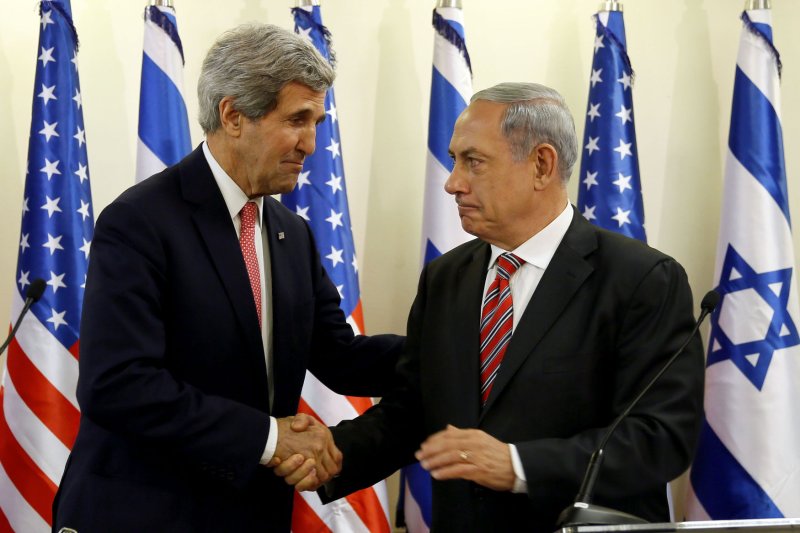Israeli Prime Minister Benjamin Netanyahu (R) shakes hands with U.S. Secretary of State John Kerry during a press conference following a meeting at Netanyahu's Jerusalem office on December 5, 2013. Kerry insisted that Israel's security was a top priority in talks with Iran on its controversial nuclear program after an initial deal was signed. UPI/Gali Tibbon/Pool |
License Photo
JERUSALEM, Dec. 12 (UPI) -- U.S. Secretary of State John Kerry, who returns to Israel Thursday, is dooming peace talks by siding with Israel, sources told Palestinian newspaper al-Ayam.
Meanwhile, Jerusalem's chief negotiator in the talks said she was confident the talks would succeed.
Kerry has adopted the Israeli position on security arrangements, Palestinian sources in Ramallah were quoted by the West Bank newspaper as saying.
This alleged prejudice will torpedo all the other issues under discussion, including the so-called core issues, the sources said.
Core issues in the Israeli-Palestinian negotiations are usually defined as borders, Jerusalem, security, refugees and recognition of Israel as the nation-state of the Jewish people.
"It seems as if the next stage of the negotiations will be based on principles that the Palestinians cannot accept, and thus Kerry will bear responsibility for the failure of the talks. He is not operating as a neutral sponsor and mediator," a source said.
The State Department had no immediate comment on the report.
Kerry is to arrive in Jerusalem Thursday to discuss with Prime Minister Binyamin Netanyahu the Obama administration's intention to present a "framework agreement" for a permanent Israeli-Palestinian peace treaty in the coming weeks, U.S. and Israeli officials said.
Kerry is to meet with Palestinian Authority President Mahmoud Abbas Friday.
The framework will not be presented as, "Here's a plan -- please ask for an up or down [vote]," State Department spokeswoman Jen Psaki told reporters in Washington.
"This is an ongoing discussion," she said.
The Obama administration's proposed Israeli-Palestinian security arrangements were drawn up by retired Marine Corps Gen. John R. Allen, the State Department said.
Israel has said it will accept only an arrangement that lets Israel keep a security presence along the Jordan River, something the Palestinian Authority has rejected.
One idea being discussed is for an Israeli Jordan River presence to remain for a limited time of perhaps 10 or 15 years, the Jerusalem Post reported.
A senior Netanyahu aide told Haaretz the framework agreement would "oblige the parties to make decisions, and only then it will be possible to know if the peace talks will advance or blow up."
Israeli and Palestinian negotiators have met some 20 times in the past four months but have not gone beyond presenting basic positions, Haaretz said.
Participants on both sides have promised not to disclose information about the talks' details or progress, but Haaretz said the negotiations began to stumble a few weeks ago and were in danger of collapsing over Israel's construction of West Bank settlements.
That possibility prompted Kerry and special U.S. envoy Martin Indyk, a former ambassador to Israel, to take a much more active role in the negotiations, Haaretz said.
President Barack Obama said Saturday he was now willing to adjust his desire for the talks' end result.
"I think it is possible over the next several months to arrive at a framework that does not address every single detail but gets us to a point where everybody recognizes it's better to move forward than move backward," Obama told the annual Saban Forum at the Brookings Institution's Saban Center for Middle East Policy.
Israeli Justice Minister Tzipi Livni, Jerusalem's chief negotiator in the talks, said Wednesday Israel's choice was now between building more isolated settlements in the West Bank and building security for Israel.
"My choice is clear -- peace and security, and not settlements and isolation," she told students at Tel Aviv University.
Livni, who holds regular meetings with chief Palestinian negotiator Saeb Erekat, predicted the two sides would reach a final, two-state accord.
"We are capable of making a decision that will lead to two states," but the process "will be gradual, and its implementation will be gradual," she said.















